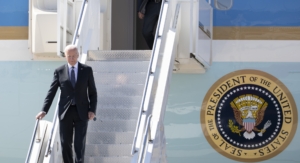Doha Dancing and Obamacare Opioids
Here’s What You Need to Know
What does Doha have to do with the 2016 elections? A lot more than you think. Earlier this week in Doha, Qatar, the Organization of the Petroleum Exporting Countries (OPEC) and Russia failed to agree to an oil production freeze in an attempt to respond to declining oil prices and overproduction. Negotiations fell apart after Saudi Arabia demanded Iran also cap its oil production.
What happened in Doha won’t stay in Doha and has significant political ramifications here in America:
- Presidential Campaign Game Changer? Low oil prices mean low prices at the pump for American consumers, thus removing from the 2016 Presidential campaign debate the time-honored political troupe of bemoaning pain at the gas pump. But this pain has been replaced by another challenge. Low oil prices are thanks in part to the fracking revolution that has made America into the Saudi Arabia of natural gas. But that boom has turned to bust as low prices have made it difficult to keep operations afloat, resulting in struggling economies in battleground states like Ohio and Pennsylvania that will have an impact in November.
- Middle East Instability – With More To Come: With President Obama traveling in Saudi Arabia this week as part of his foreign farewell tour, the failed Doha negotiations have the potential to define his Middle East legacy as one of complete failure. As Ian Bremmer of the Eurasia Group explains, “Geopolitically, the impact of low oil prices is concentrated in the Middle East, where political structures are brittle and based on oil wealth-supported patronage.” Low oil prices increase the potential for chaos in a region already steeped in turmoil. And the next leader of the free world will have to construct a foreign policy within these conditions in order to address the region’s instability.
- Wild Markets, Wildcard Voters: The fallout from this failure has led to increasedvolatility in an already unstable oil market. Crude oil futures fell internationally as traders were caught off-guard by the meeting’s failure. In a recent interview, oil analyst John Kilduff at Again Capital, claimed oil could fall to $20 a barrel before rebalancing. Geopolitical unpredictability has a multiplier effect on economic unpredictability. And economic unpredictability that has fed much of the discontent we have seen from voters this primary season will only get larger.
What seems like just another failed negotiation among rival oil producers is a game changer for this November and beyond.
Subscribe to Receive Insights
"*" indicates required fields
News You Can Use
TAXPAYER-SUBSIDIZED POLITICO REPORTERS?
A new document released from California’s Office of Business and Economic Growth reveals Politico is set to receive a $205,000 tax credit from the state for opening a Sacramento bureau. The Daily Caller reports: “According to the document, in 2017 the number of employees in the bureau must be 34 and the minimum salary would be $50K. By 2020 the employee head count rises to 41.” There has been a longstanding debate on whether state and local governments should engage in job creation tax incentives, and it appears that the stakeholders now include journalists.
OBAMACARE INCENTIVIZING OPIOID USE?
A new Obamacare initiative aimed at rewarding quality of care may in fact be fueling America’s opioid epidemic. The patient satisfaction survey used to determine the reward payments to hospitals asks patients multiple questions regarding the hospital’s attention to their pain management. Yet, a 2012 study found that more satisfied patients spend more on prescription drugs and have higher mortality rates, and a 2014 study found that “over 48% of doctors reported prescribing inappropriate narcotic pain medication because of patient-satisfaction questions.” It’s yet another example of how increased government involvement in healthcare can lead to unintended consequences.
THE INTERNET NEVER FORGETS
Last week UC-Davis reportedly spent $175,000 in an attempt to remove from the Internet a 2011 photo of a campus police-officer pepper spraying peaceful student protesters on its campus. The Sacramento Bee reported that “the payments, made to two separate firms—a company called Nevins & Associates and a second called IDMLOCO—were meant to polish the school’s damaged reputation.” UC-Davis soon learned a lesson efficiently explained by Esquire’s Luke O’Neil “On the Internet, any cover-up is just another opportunity to remind everyone that the crime happened in the first place.”
FACEBOOK BUBBLES
Megan McArdle of Bloomberg View writes “Even as Americans talk more and more about diversity, they are increasingly dividing themselves into like-minded bubbles where other people, with other experiences and viewpoints, almost never penetrate.”Social media amplifies this problem, as sites like Facebook tailor our newsfeeds based on our “likes” – showing us more content that we agree with than content that we don’t agree with. McArdle argues this phenomenon is influencing the 2016 presidential race as voters appear less interested in the broader political landscape and “people are not even aware that there is another side that doesn’t share their thinking.” This phenomenon may help explain the increasingly unpredictable electorate that has shocked the political elites of both parties.
BIPARTISAN OPPOSITION TO LEW RULES
Politico featured a letter from “a group of bipartisan high-ranking Treasury officials from six presidential administrations” sent to Treasury Secretary Lew on Tax Day, encouraging him to reconsider his recent decision to curb inversions through increased regulatory measures. They argued, “Current rules regarding corporate inversions don’t need revision. Instead, we urge you to focus your attention on addressing the competitive disadvantages that harm capital investment, employment, and economic growth in the United States.” These former senior economic, tax, and financial policy experts said the only solution to the problem would be comprehensive tax reform that would “level the playing field with international competitors.”
FREE TRADE’S “LOSERS” ARE WINNING
Historically the U.S. has favored free trade policies, but 2016 has proven to be a paradigm-shifting year as presidential candidates from both parties have opposed President Obama’s Trans-Pacific Partnership (TPP). Irwin Stelzer of The Weekly Standard writes, “Voters are convinced free trade is inimical to their interests, and even if it were a good thing our trading partners don’t play fair.” What has changed is a perception of the “balance of winners and losers” in these agreements. Yes, free trade results in lower priced goods for consumers. But, what voters focus on are the layoffs of blue-collar workers whose industries have shifted overseas. If a campaign hopes to revive the popularity of free trade, they will need a new message that addresses voters’ concerns rather than wonky explanations.
QUANTUM LEAPING TRUDEAU
The collective media horde hailed Canadian Prime Minister Justin Trudeau’s seemingly spontaneous explanation of quantum computing this past week. But the reality is far from the fawning media reports. After spending the morning touring Perimeter Institute for Theoretical Physics, Trudeau had encouraged reporters to ask him the question and his answer did not stand up to expert scrutiny. It seems the media was so enamored with the fact that Trudeau had an answer that they forgot to actually listen to it.
BREXIT-ICSM
EU Commissioner for Financial Stability Lord Jonathan Hill calls for “for more scepticism in the debate about Europe,” noting, “Thirty years ago it was the Euro-enthusiasts who were the utopians. When people like me asked what the Euro might mean for Britain’s economy, we were told not to worry and that everything would be fine. But today the Outers are the utopians. It is Leave campaigners who give sweeping assurances and try to close down the argument about what might happen after June 23rd if Britain votes to leave. We needed scepticism before and we need it now.”
Mark Your Calendars
Tuesday, April 26: Connecticut, Delaware, Maryland, Pennsylvania, and Rhode Island Primaries
Tuesday, May 3: Indiana Primary
Subscribe here to get TL;DR in you inbox each week.



